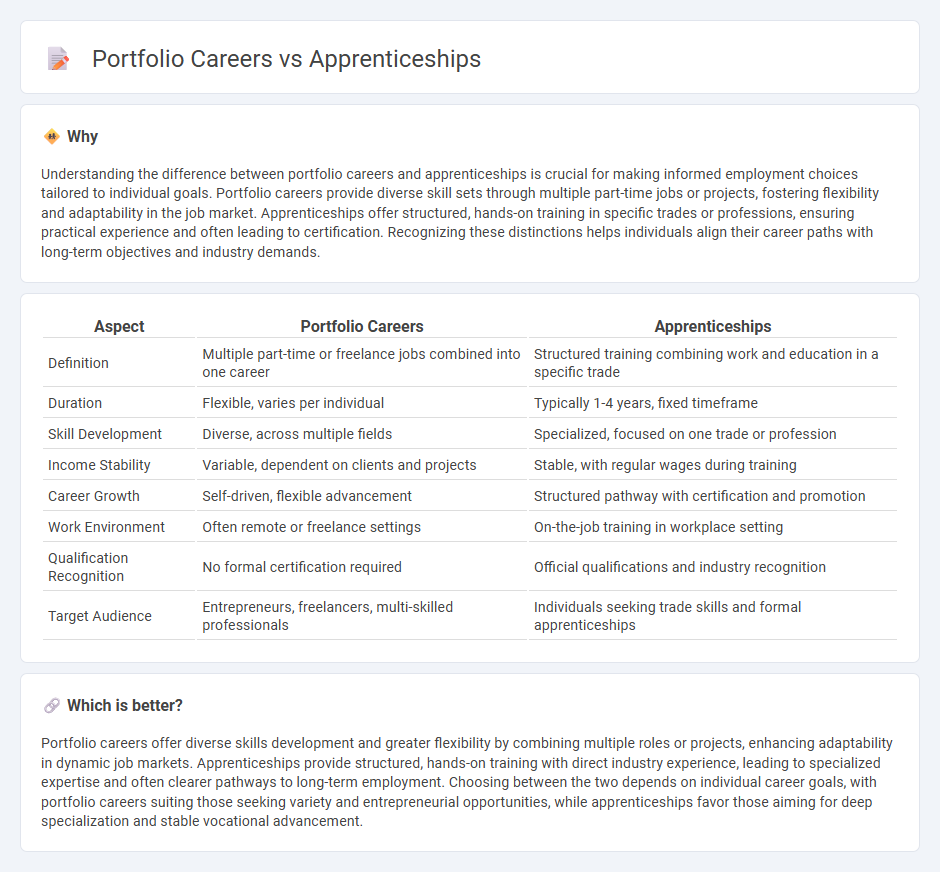
Portfolio careers offer professionals the flexibility to diversify income streams and develop a broad skillset across multiple fields, enhancing adaptability in the evolving job market. Apprenticeships provide structured, hands-on training within a specific trade or profession, delivering practical experience and industry-recognized qualifications that boost employability. Explore the unique benefits and pathways each option offers to determine which best suits your career goals.
Why it is important
Understanding the difference between portfolio careers and apprenticeships is crucial for making informed employment choices tailored to individual goals. Portfolio careers provide diverse skill sets through multiple part-time jobs or projects, fostering flexibility and adaptability in the job market. Apprenticeships offer structured, hands-on training in specific trades or professions, ensuring practical experience and often leading to certification. Recognizing these distinctions helps individuals align their career paths with long-term objectives and industry demands.
Comparison Table
| Aspect | Portfolio Careers | Apprenticeships |
|---|---|---|
| Definition | Multiple part-time or freelance jobs combined into one career | Structured training combining work and education in a specific trade |
| Duration | Flexible, varies per individual | Typically 1-4 years, fixed timeframe |
| Skill Development | Diverse, across multiple fields | Specialized, focused on one trade or profession |
| Income Stability | Variable, dependent on clients and projects | Stable, with regular wages during training |
| Career Growth | Self-driven, flexible advancement | Structured pathway with certification and promotion |
| Work Environment | Often remote or freelance settings | On-the-job training in workplace setting |
| Qualification Recognition | No formal certification required | Official qualifications and industry recognition |
| Target Audience | Entrepreneurs, freelancers, multi-skilled professionals | Individuals seeking trade skills and formal apprenticeships |
Which is better?
Portfolio careers offer diverse skills development and greater flexibility by combining multiple roles or projects, enhancing adaptability in dynamic job markets. Apprenticeships provide structured, hands-on training with direct industry experience, leading to specialized expertise and often clearer pathways to long-term employment. Choosing between the two depends on individual career goals, with portfolio careers suiting those seeking variety and entrepreneurial opportunities, while apprenticeships favor those aiming for deep specialization and stable vocational advancement.
Connection
Portfolio careers and apprenticeships are connected through their shared emphasis on diverse skill development and practical experience. Portfolio careers allow individuals to cultivate multiple roles across various industries, while apprenticeships provide structured, hands-on training in specific fields, enhancing employability and career flexibility. Together, they support adaptive workforce strategies by combining experiential learning with multifaceted professional growth.
Key Terms
Structured Training
Structured training in apprenticeships offers a clear, step-by-step development path combining hands-on experience with formal education, ensuring skill acquisition aligned with industry standards. Portfolio careers emphasize diverse skill sets gained through various roles, often requiring self-directed learning without a fixed curriculum. Explore deeper insights into how structured training shapes career trajectories and skill mastery.
Skill Diversification
Apprenticeships provide structured, hands-on training in specific trades, fostering deep expertise through real-world experience. Portfolio careers emphasize skill diversification by blending multiple roles or projects, allowing professionals to adapt to various industries and demands. Explore the benefits and strategies for developing a versatile career path with either approach.
Career Flexibility
Apprenticeships provide structured training with a clear career path, offering stability and skill mastery in a specific trade or profession. Portfolio careers, by contrast, enable individuals to engage in multiple concurrent roles across different fields, maximizing career flexibility and diverse income streams. Explore more about how each approach shapes long-term career adaptability and growth.
Source and External Links
Career Seekers - Apprenticeship.gov - Apprenticeships are paid, industry-driven career pathways combining on-the-job learning with classroom instruction, offering wage increases and nationally recognized credentials while preparing individuals for skilled careers.
Apprenticeship for Career Seekers - Apprenticeship Colorado - Apprenticeships provide hands-on learning with pay, leading to well-paying jobs across various industries and yielding higher lifetime earnings and employment retention for participants.
Apprenticeship Utah - Apprenticeships are "earn and learn" programs combining on-the-job training with classroom education, offering wage growth, job security, and portable credentials, while helping employers build skilled workforces.
 dowidth.com
dowidth.com